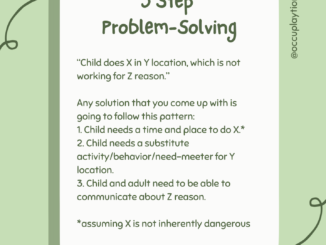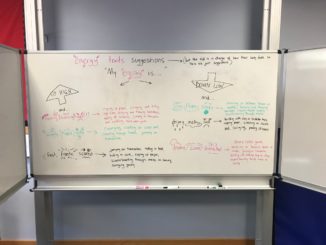A lot of public schools in the US, and at least some in the UK near where I live, have begun figuring out how they can teach social-emotional skills and things like self-regulation and coping skills to children.
I need to say outright at the beginning of this that I am not *against* that. I think that it’s great that kids’ mental health is being recognised as an important factor in their success in school and that it’s important enough for people to even prioritise over academics, or at least in tandem with academics. I think that it makes perfect sense that this is a “figuring out process” and wasn’t perfect from the get-go, because most things aren’t — they take time to figure out. I think that it’s CRUCIALLY important that in the wake of covid, with the amount of trauma that students have experienced and many are ongoingly experiencing, that schools be aware of the power they have to be able to equip kids with emotional skills like these and figure out how to use that power wisely and helpfully, and I think there are many many many therapists and school counsellors and other supporting staff out there in the world right now who are trying their utmost to do exactly that.
There is a problem on a systemic level with this plan. By “systemic” I mean that I would never point to any single counsellor and be like “you’re the problem here” and I would never blame a teacher for doing everything they can within this system, but that the system is still set up for failure anyway—or if not quite so drastic a word as “for failure”, then for a struggle if nothing else. And the reason for that is that in my experience, many schools and therapists and teachers, and even parents and caregivers who are taking their lead from the schools and educators, are trying to get their child to buy in to a system of overt, artificial, self-regulation tools while systemically, the natural self-regulation skill-building activities are almost entirely, if not entirely, suppressed.
Here’s what I mean by that: Wrestling, rough-and-tumble play, builds self-regulation. Playing with risky tools and materials builds self-regulation. Playing freely with sensory-rich materials builds self-regulation. Playing socially with others, fighting, arguing, bickering, builds self-regulation. Getting loud and yelling and moving through a range of volumes builds self-regulation. Trying to do hard things that you can’t do yet that you yourself chose and are motivated to do builds self-regulation.
Sensory-rich stims and fidgeting and play and self-soothing techniques are self-regulation tools. Picking things apart is a self-regulation tool. Sucking and chewing on and mouthing things is a self-regulation tool. Stomping your feet is a self-regulation tool. Yelling is a self-regulation tool. Crying is a self-regulation tool. Picking up heavy things and flipping them over or throwing them is a self-regulation tool. Throwing yourself on the ground and feeling a hard impact is a self-regulation tool. Running around, rolling, flipping, somersaulting, wiggling is a self-regulation tool.
Almost every single one of those things I just named comes naturally to a child or a group of children left to their own devices. Almost every single one of those things I just named are utterly policed to the maximum degree by school and childcare professionals.
Some of that is necessary. I understand why there can’t be a class of thirty kids and they’re all freely allowed to wrestle one another or outright fight without any adult support. That’s why I called this a systemic issue. This is an issue in the way that our systems have built. We’ve built systems that can’t support children being children and then we blame the children for the fact that it’s not working.
We have tried to replace all of the collective of these things with, like, “A counsellor will come into your classroom and teach you all how to do deep breaths and maybe a yoga pose,” and we wonder why it’s not working sufficiently for them. It’s like taking a plant and saying “well, we won’t let it have any water, sunshine, or soil, but we’ve put it under an artificial bulb and given it a sort of scientifically engineered jelly, and we can’t tell why it’s not working.”
The ingredients you’re using to replace the natural ones don’t do the same thing. 20 minutes of recess, with monitors around to boss kids about all the things they can’t play, and strict rules about how kids can move their bodies, and only peers available who are exactly the same age as you, and a highly artificial environment socially and in terms of materials around, does not replace 6-8 hours of unstructured free play according to one’s own brain and own ideas. It’s almost laughable to think that it possibly could. And adding in practice with deep breathing and “brain breaks” where everybody dances to a YouTube video for 3 minutes (which is incidentally also trying to cram more literacy information into your brain) into the day doesn’t make up for that lack either.
It’s like the system is going, “Hey, our kids are stressed out. Let’s teach them factual information about bodily stress and some prepackaged solutions for de-stressing,” rather than realizing that the reason the kids are stressed in the first place is because they’re spending all day every day in a box designed to produce stress in them.
Every time that I post something like this, there’s people in the comments saying, “Just homeschool your kid.” And I’m all the way in favor of homeschooling. AND, I also work in schools, I love schools, I love what schools do for their communities, I think schools have so much potential, I think governments owe good schooling to their children, to their future generations. I am not and I will never be willing to just throw up my hands and say “Just homeschool.” You will always, unequivocally, have my full support if that’s what you do—whether you choose to or whether you have to, whether you have no other choice, whether you wanted to from the time your kid was a baby or whether you did so in response to this type of stress, whether you saw the school system break your kid or whether your kid was doing OK. There’s a lot of reasons why people homeschool and I am all the way here to back up in support them and I will also never stop saying, schools, systems, we can’t be like this. We could make it better. We actually could if we, systemically, tried.



